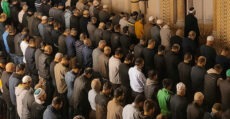Reference: Fataawa Ramadhaan – Volume 2, page 517, Fatwa No. 481
al-Fataawa libni Fowzaan – Kitaab ad-Da’wah, Volume 1, Page 158-160
Question: Some people, whilst driving in their cars and they are fasting, begin to use bad language leading to the abuse of others when the traffic becomes busy. So, what is the ruling concerning their fast?
Response: As for the fast, then it is correct as the impermissible statements and actions do not invalidate the fast. However, without doubt it reduces the reward and loses its benefits and fruits. From that which is intended from the fast is fear of Allaah (Taqwah) as He (Subhaanahu wa Ta’aala) said:
{O you who believe! Fasting is prescribed for you as it was prescribed for those before you, that you may become al-Muttaqoon (the pious)} [Soorah al-Baqarah, Aayah 183].
So, Allaah has explained the wisdom behind the obligation of fasting upon us and that is to attain fear of Allaah (Subhaanahu wa Ta’aala). The Prophet ﷺ said:
«One who does not abandon evil talk and actions, then Allaah is not in need of him abandoning his food and drink (i.e. his fasting)».
Rather, the Prophet ﷺ commanded the one who is fasting that, should someone curse him or attempt to kill him, he should say:
«I am fasting»
…such that the one who is swearing and abusing is deterred. By this, he will know that the one who is fasting has not responded because of any weakness but, rather, because of piety and fear of Allaah because he is fasting. That which is obligatory upon the fasting person and other than him is that he be patient and persevering, not allowing these conflicting issues to affect him regardless of how he feels inside. It is confirmed from the Prophet ﷺ that a man said: “O Messenger of Allaah, advise me”. He ﷺ replied:
«Don’t become angry»
…and he ﷺ repeated this a number of times:
«Don’t become angry».
So, how many people feel remorse at what they have done in anger, and wish that they hadn’t said or done such and such whilst angry. But that which has come to pass is not possible to take back.





